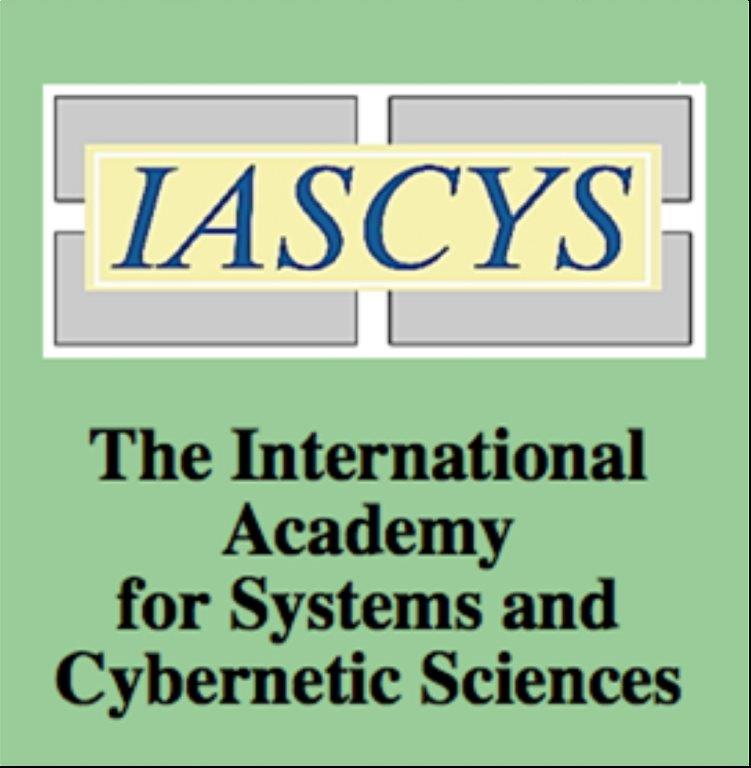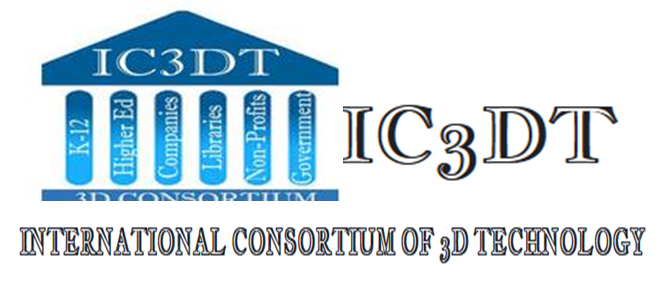Proceedings of the 14th International
Multi-Conference on
Society, Cybernetics and Informatics: IMSCI 2020
FOREWORD
Informatics and Cybernetics (communication and control)
are having an increasing impact on societies and in the globalization
process that is integrating them. Societies are trying to regulate this
impact, and adapt it to their respective cultural infra-structures. Societies
and cultures are in reciprocal co-adaptations with Information and Communication
Technologies. Synergic relationships might emerge in this co-adaptation
process by means of positive and negative feedback loops, as well as feedforward
ones. This would make the whole larger than the sum of its parts, generating
emergent properties in the parts involved as well as in the whole coming
forth. The academic, private, and public sectors are integrating their
activities; multi-disciplinary groups and inter-disciplinary teams are
being formed, and collaborative research and development projects are
being organized in order to facilitate and adequately orient the design
and implementation of the feedback and the feedforward loops, and potentially
generating synergic relationships. This phenomenon persuaded the Organizing
Committee to organize The 14th International Multi-Conference
on Society, Cybernetics and Informatics (IMSCI 2020) in a multi-disciplinary
context along with other collocated events. Consequently, participants
may focus on one discipline, while allowing them the possibility of attending
conferences from other disciplines. This systemic approach stimulates
cross-fertilization among different disciplines, inspiring scholars, originating
new hypothesis, supporting production of innovations and generating analogical
thinking.
IMSCI 2020 was organized and sponsored by the International Institute of Informatics and Systemics (IIIS, www.iiis.org), member of the International Federation of Systems Research (IFSR). The IIIS is a multi-disciplinary organization for inter-disciplinary communication and integration, which includes about 5000 members. Consequently, a main purpose of the IIIS is to foster knowledge integration processes, interdisciplinary communication, and integration of academic activities. Based on: 1) the transdisciplinarity of the systemic approach and its emphasis on relationships and integrating processes, and 2) the multi-disciplinary support of cybernetics’ and informatics’ concepts, notions, theories, technologies, and tools, the IIIS has been organizing multi-disciplinary conferences as a platform for fostering inter-disciplinary communication and knowledge integration processes.
One of the main purposes of IMSCI 2020 is to bring together academics, professionals, and managers from the private and the public sectors, in order to share ideas, results of research, and innovative services or products, in a multi-disciplinary and multi-sector forum. Educational technologies, socioeconomic organizations, and sociopolitical processes are essential domains among those involved in the evolving co-adaptation and co-transformation between societies and cultures on the one hand, and between informatics and cybernetics (communication and control) on the other hand. Consequently, the main conference in the context of the IMSCI 2020 Multi-Conference is the 18th International Conference on Education and Information Systems, Technologies and Applications: EISTA 2020. The relationship between education/training and Information and Communication Technologies (ICT) is quickly intensifying and sometimes appears in unexpected forms and in combination with original ideas, innovative tools, methodologies, and synergies. Accordingly, the primary purpose of EISTA 2020 has been to bring together researchers and practitioners from both areas together to support the emerging bridge between education/training and the ICT communities.
In the context of EISTA 2020, practitioners and consultants were invited to present case studies and innovative solutions. Corporations were invited to present education/training information systems and software-based solutions. Teachers and professors were invited to present case studies, specifically developed information systems, and innovative ideas and designs. Educational scientists and technologists were invited to present research or position papers on the impact and the future possibilities of ICT in educational systems, training processes, and methodologies. Managers of educational organizations and training consultants were invited to present problems that might be solved with ICT or solutions that might be improved by different approaches and designs in ICT.
EISTA 2020 provides a forum for the presentation of solutions and problems in the application of ICT in the fields of education/training. Authors of the papers included in the proceedings provided diverse answers to the following questions:
On behalf of the Organizing Committees, I extend our heartfelt thanks to:
A total of 639 reviews made by 302 reviewers (who made at least one review), from 56 countries, contributed to the quality achieved in IMSCI 2020. This means an average of 6.59 reviews per submission (97 submissions were received). Each registered author had access, via the conference web site, to the reviews that recommended the acceptance of their respective submissions. Each registered author could also get information about: 1) the average of the reviewers evaluations according to 8 criteria, and the average of a global evaluation of his/her submission; and 2) the comments and the constructive feedback made by the reviewers, who recommended the acceptance of his/her submission, so the author would be able to improve the final version of the paper.
In the organizational process of IMSCI 2020, about 97 articles were submitted. These post-conference proceedings include about 45 papers, from 20 countries that were accepted for presentation (35 countries taking into account the presentations in collocated events). We extend our thanks to co-chairs special tracks organizers for their support. The submissions were reviewed as carefully as time permitted; it is expected that most of them will appear in a more polished and complete form in scientific journals.
This information about IMSCI 2020 is summarized in the following table, along with the other collocated conferences:
All submissions were peer reviewed by the two-tier reviewing methodology of the International Institute of Informatics and Systemics (IIIS, www.iiis.org). As it might be noticed, from the table above, 6.59 reviews were made, in average, for each submission we received. After the conference is over, the names of the reviewers will be published on the IIIS web site along with the titles of the papers each reviewer reviewed. This means that what had been a double-blind review, up to the conference, is transformed to single-blind review, after the conference is over. In this way, each author would have information about the names of the reviewers of his/her submission, but not vice-versa. Likewise, each author would know how many reviewers reviewed his/her submission and relate it to the average, being informed in the above table, of 6.59 reviews per paper.
Our two-tier reviewing methodology meet two different objectives of peer-review: 1) to improve the paper via non-anonymous reviewers (non-blind reviews) and 2) to improve the acceptance/non-acceptance decision of the Organizing Committee via traditional anonymous reviewers (double-blind reviews) A recommendation to accept, made by non-anonymous reviews, is a necessary condition, but it is not a sufficient one. A submission, to be accepted, should also have a majority of its double-blind reviewers recommending its acceptance. These two necessary conditions generate a more reliable and rigorous reviewing than any of those reviewing methods, based on just one of the indicated methods, or just on the traditional double-blind reviewing.
We extend our gratitude to the co-editors of these proceedings for the hard work, energy and eagerness they have shown in organizing their conferences and preparing their respective sessions. We express our intense gratitude to Professor William Lesso (1931-2015) for his wise, timely, adequate and valuable tutoring, as well as for his eternal energy, integrity, and continuous support and advice, as the Program Committee Chair of past conferences, and as Honorary President of WMSCI 2020, as well as for being a very caring old friend and intellectual father to many of us. We also extend our gratitude to Professor Belkis Sánchez, who brilliantly managed the organizing process.
We would like also to extend our gratefulness to Professor Shigehiro Hashimoto for his yearly support in the last 20 years as well as for his editorial work for the journal; as well as to Professor Grandon Gill, Dr. Jeremy Horne, Professor Thomas Marlowe and Professor Matthew E. Edwards for their continuous advice and support in the conferences they participated in, along the last 12 years; as well as in the conferences they were not able to participate in. Their advices and the kind of care they provided us with are highly valued and appreciated.
We also extend our gratitude to the following scholars, researchers, and professionals who generously accepted to deliver keynote addresses or to organize invited sessions.
Plenary Keynote Speakers (ordered by their presentations succession)
Professor Shigehiro Hashimoto, Japan, Kogakuin University, Councilor and Dean, Faculty of Engineering, Former Associate to the President, Doctor of Engineering and Doctor of Medicine, Research Area: Biomedical Engineering.
Professor Thomas Marlowe, USA, Seton Hall University, Professor Emeritus, Department of Mathematics and Computer Science, PhD in Computer Science and PhD in Mathematics.
Dr. Robert Cherinka, USA, MITRE Corporation, Chief Engineer, Software Engineering Technical Center at MITRE.
Mr. Joseph Prezzama, Msc., USA, MITRE Corporation, Co-Department Head for the Joint Operations Southeast, Tampa office of the MITRE Corporation, MS Software Engineering.
Dr. William Muirhead, Canada, University of Ontario, Institute of Technology, founding researcher of the EILAB in the UOIT Faculty of Education. Former Associate Provost, founding academic administrator of the university.
Dr. Lorayne Robertson, Canada, University of Ontario, Institute of Technology (UOIT), Former Assistant Dean in the Faculty of Education, Former Director of the Graduate Programs in Education.
Dr. Peter Holowka, Canada, Werklund School of Educational Technology at the University of Calgary, West Point Grey Academy in Vancouver, British Columbia.
Dr. Steven Ehrlick, Canada, Ryerson University, School of Media, Department of Radio and Television Arts, Associate Professor & Director, The Music Den.
Professor T. Grandon Gill, USA, University of South Florida, College of Business, Director of the Doctorate in Business Administration, Editor-in-Chief of Informing Science , Editor of the Journal of IT Education.
Fr. Dr. Joseph R. Laracy, USA, Seton Hall University, Department of Systematic Theology & Department of Mathematics and Computer Science.
Professor Richard Segall, USA, Arkansas State University, Department of Computer and Information Technology, Neil Griffin College of Business.
Dr. Luigi Serra, Italy, Cagliari, National Research Council of Italy, Institute of History of Mediterranean Europe, Technical Collaborator of Research Institutes and CTO at CNR ISEM (Istituto di Storia dell’Europa Mediterranea).
Professor Sukjin Kang, South Korea, Korea Aerospace University, Faculty of Business School. Head of College of Liberal Studies. Director of Interdisciplinary Studies in KAU, Director of Korean Society for Teaching English Literature, Director of The English Language and Literature Association of Korea.
Professor Mark M. Budnik, USA, Valparaiso University. Electrical and Computer Engineering, Paul H. Brandt Professor in Engineering, Houghton College. Electrical Engineering, Irwin Chair of Engineering.
Dr. Mario LaManna, Italy/USA, Evoelectronics (Italy), and Selex-SI (USA), Senior Scientist and Project Leader, Projects in the fields of defense and security.
Professor Mohammad Ilyas, USA, Florida Atlantic University. College of Engineering and Computer Science, Former Dean of the College of Engineering and Computer Science, Member of Global Engineering Deans Council.
Dr. Russell Jay Hendel, USA, Towson University, Dept. of Mathematics, doctoral program at the Spertus Institute for a degree in Jewish studies.
Professor Wen-Chen Hu, USA, University of North Dakota, School of Electrical Engineering & Computer Science, Editor-in-chief, International Journal of Handheld Computing Research (IJHCR), 2010-2017.
Dr. Madhumita Banerjee, USA, University of Wisconsin-Parkside, Sociology Department. Assistant Professor and Director, Sociology Online Degree Completion Program.
Dr. Tilia Stingl De Vasconcelos, Austria, Business Consultant, Austria, Member of the European Society for Education and Communication, Previously, University of Applied Sciences Austria, Information Management and Cross Cultural Communication.
Mg. Philip Belcredi, Austria, CEO (OMV, Compass Group, Pewag), Comparative-Systemic Intervention.
Keynote Speakers (Alphabetical Order)
Dr. Kevin Foltz, USA, Institute for Defense Analyses, Information Technology and Systems Division, Independent Technical Analyst for the Department of Defense.
Professor Elina Gaile-Sarkane, Latvia, Riga Technical University, Dean of the Faculty of Engineering Economics and Management (FEEM).
Dr. Tina Haase, Germany, Aunhofer Institute for Factory Operation and Automation IFF, Magdeburg.
Dr. Maria Jakubik, Finland, Haaga-Helia University of Applied Sciences, Hanken School of Economics, Head of Master's Degree, Programme in International Business Management (IBMA).
Professor Natalja Lace, Latvia, Riga Technical University, Head of Department of Corporate Finance and Economics, Faculty of Engineering Economics and Management (FEEM).
Dr. Songmei Yu, USA, Felician University, Department of Computer Science, Institute for Information Science.
Invited Sessions Organizers (Alphabetical Order)
Professor Renata Baracho, Brazil, Federal University of Minas Gerais, President of the National of Research and post-graduate Studies in Information Sciences (Associação Nacional de Pesquisa e Pós-Graduação em Ciência DA Informação – ANCIB).
Professor Elina Gaile-Sarkane, Latvia, Riga Technical University, Dean of the Faculty of Engineering Economics and Management (FEEM).
Professor Shigehiro Hashimoto, Japan, Kogakuin University, Councilor and Dean, Faculty of Engineering, Former Associate to the University President. Doctor of Engineering and Doctor of Medicine. Biomedical Engineering.
Professor Inga Lapina, Latvia, Riga Technical University, Vice Dean for Academic Affairs, Faculty of Engineering Economics and Management (FEEM).
Dr. William Muirhead, Canada, University of Ontario, Institute of Technology, founding researcher of the EILAB in the UOIT Faculty of Education. Former Associate Provost, founding academic administrator of the university.
Professor Marcelo Porto, Brazil, Federal University of Minas Gerais, Department of Transportation Engineering and Geotechnics.
Dr. Lorayne Robertson, Canada, University of Ontario, Institute of Technology (UOIT), Former Assistant Dean in the Faculty of Education, Former Director of the Graduate Programs in Education.
Many thanks to the members of the Organizing Committee and to those who chaired special tracks. We would also like to express our special gratefulness to Professor Thomas Marlowe. Professor T. Grandon Gill, Dr. Jeremy Horne, Professor Sukjin Kang, Professor Shigehiro Hashimoto, Dr. Russell Jay Hendel, Professor Michael Savoie, Professor Hsing-Wei Chu, etc. for their generosity in providing support with their advices and for answering our inquiries, as well as for their spontaneous and timely alerts. Thank you so very much.
Our gratefulness is also extended to the organizations that provided scientific, academic, professional, or corporate co-sponsorships in this conference and/of previous ones. The following are among these organizations:
Special thanks to Dr. Jeremy Horne, Dr. Harvey Hyman, and Ms. Molly Youngblood Geiger (Google Partners Community Ambassador) for their efforts in helping us with the identification of above shown co-sponsors.
There is no way to express the huge gratitude we have to Professor Belkis Sanchez for the great job she did as President of the Organizing Committee; analyst, designer, and manager of the implementation of the information systems required for this virtual conference; chair of the printed and electronic proceedings; and general director of the Conference Secretariat.
Professor Nagib C. Callaos, Ph.D.
IMSCI 2020 was organized and sponsored by the International Institute of Informatics and Systemics (IIIS, www.iiis.org), member of the International Federation of Systems Research (IFSR). The IIIS is a multi-disciplinary organization for inter-disciplinary communication and integration, which includes about 5000 members. Consequently, a main purpose of the IIIS is to foster knowledge integration processes, interdisciplinary communication, and integration of academic activities. Based on: 1) the transdisciplinarity of the systemic approach and its emphasis on relationships and integrating processes, and 2) the multi-disciplinary support of cybernetics’ and informatics’ concepts, notions, theories, technologies, and tools, the IIIS has been organizing multi-disciplinary conferences as a platform for fostering inter-disciplinary communication and knowledge integration processes.
| Multi-disciplinary conferences are
organized by the IIIS as support for both intra-
and inter-disciplinary communication.
Processes of intra-disciplinary communication are mainly achieved
via traditional paper presentations in corresponding disciplines,
while conversational sessions, regarding trans- and inter-disciplinary
topics, are among the means used for inter-disciplinary communication.
Intra- and inter-disciplinary communications might generate co-regulative
cybernetic loops, via negative feedback, and synergic
relationships, via positive feedback loops, in which both kinds
of communications could increase their respective effectiveness.
Figure 1 shows at least two cybernetic loops if intra- and inter-disciplinary
are adequately related. A necessary condition for the effectiveness
of Inter-disciplinary communication is an adequate level of variety
regarding the participating disciplines. Analogical thinking
and learning processes of disciplinarians depend on it; which
in turn are potential sources of the creative tension required for
cross-fertilization among disciplines and the generations of new
hypotheses. An extended presentation regarding this issue can be
found at: www.iiis.org/MainPurpose |

|
One of the main purposes of IMSCI 2020 is to bring together academics, professionals, and managers from the private and the public sectors, in order to share ideas, results of research, and innovative services or products, in a multi-disciplinary and multi-sector forum. Educational technologies, socioeconomic organizations, and sociopolitical processes are essential domains among those involved in the evolving co-adaptation and co-transformation between societies and cultures on the one hand, and between informatics and cybernetics (communication and control) on the other hand. Consequently, the main conference in the context of the IMSCI 2020 Multi-Conference is the 18th International Conference on Education and Information Systems, Technologies and Applications: EISTA 2020. The relationship between education/training and Information and Communication Technologies (ICT) is quickly intensifying and sometimes appears in unexpected forms and in combination with original ideas, innovative tools, methodologies, and synergies. Accordingly, the primary purpose of EISTA 2020 has been to bring together researchers and practitioners from both areas together to support the emerging bridge between education/training and the ICT communities.
In the context of EISTA 2020, practitioners and consultants were invited to present case studies and innovative solutions. Corporations were invited to present education/training information systems and software-based solutions. Teachers and professors were invited to present case studies, specifically developed information systems, and innovative ideas and designs. Educational scientists and technologists were invited to present research or position papers on the impact and the future possibilities of ICT in educational systems, training processes, and methodologies. Managers of educational organizations and training consultants were invited to present problems that might be solved with ICT or solutions that might be improved by different approaches and designs in ICT.
EISTA 2020 provides a forum for the presentation of solutions and problems in the application of ICT in the fields of education/training. Authors of the papers included in the proceedings provided diverse answers to the following questions:
- What is the impact of ICT in education and training?
- How ICTs are affecting and improving education and training? What networks and models are emerging?
- How are universities, schools, corporations and other educational/training organizations making use of ICT?
- What electronic tools are there to facilitate e-learning, distance education and co-operative training?
On behalf of the Organizing Committees, I extend our heartfelt thanks to:
- the 406 members of the Program Committees from 50 countries (including the events and the special tracks organized in the context of IMSCI 2020) ;
- the 223 additional reviewers, from 56 countries, for their double-blind peer reviews; and
- the 79 reviewers, from 29 countries, for their efforts in making the non-blind peer reviews. (Some reviewers supported both: non-blind and double-blind reviewing for different submissions)
A total of 639 reviews made by 302 reviewers (who made at least one review), from 56 countries, contributed to the quality achieved in IMSCI 2020. This means an average of 6.59 reviews per submission (97 submissions were received). Each registered author had access, via the conference web site, to the reviews that recommended the acceptance of their respective submissions. Each registered author could also get information about: 1) the average of the reviewers evaluations according to 8 criteria, and the average of a global evaluation of his/her submission; and 2) the comments and the constructive feedback made by the reviewers, who recommended the acceptance of his/her submission, so the author would be able to improve the final version of the paper.
In the organizational process of IMSCI 2020, about 97 articles were submitted. These post-conference proceedings include about 45 papers, from 20 countries that were accepted for presentation (35 countries taking into account the presentations in collocated events). We extend our thanks to co-chairs special tracks organizers for their support. The submissions were reviewed as carefully as time permitted; it is expected that most of them will appear in a more polished and complete form in scientific journals.
This information about IMSCI 2020 is summarized in the following table, along with the other collocated conferences:
| Conference | # of submissions received | # of reviewers that made at least one review | # of reviews made | Average of reviews per reviewer | Average of reviews per submission | # of papers included in the proceedings | % of submissions included in the proceedings |
| WMSCI 2020 | 193 | 658 | 1042 | 1.58 | 5.40 | 86 | 44.56 % |
| IMSCI 2020 | 97 | 302 | 639 | 2.12 | 6.59 | 45 | 46.39 % |
| WMSCI & IMSCI 2020 | 290 | 960 | 1681 | 1.75 | 5.80 | 131 | 45.17 % |
| CISCI 2020 | 102 | 457 | 945 | 2.07 | 9.26 | 51 | 50.00 % |
| TOTAL | 392 | 1417 | 2626 | 1.85 | 6.70 | 182 | 46.43 % |
All submissions were peer reviewed by the two-tier reviewing methodology of the International Institute of Informatics and Systemics (IIIS, www.iiis.org). As it might be noticed, from the table above, 6.59 reviews were made, in average, for each submission we received. After the conference is over, the names of the reviewers will be published on the IIIS web site along with the titles of the papers each reviewer reviewed. This means that what had been a double-blind review, up to the conference, is transformed to single-blind review, after the conference is over. In this way, each author would have information about the names of the reviewers of his/her submission, but not vice-versa. Likewise, each author would know how many reviewers reviewed his/her submission and relate it to the average, being informed in the above table, of 6.59 reviews per paper.
Our two-tier reviewing methodology meet two different objectives of peer-review: 1) to improve the paper via non-anonymous reviewers (non-blind reviews) and 2) to improve the acceptance/non-acceptance decision of the Organizing Committee via traditional anonymous reviewers (double-blind reviews) A recommendation to accept, made by non-anonymous reviews, is a necessary condition, but it is not a sufficient one. A submission, to be accepted, should also have a majority of its double-blind reviewers recommending its acceptance. These two necessary conditions generate a more reliable and rigorous reviewing than any of those reviewing methods, based on just one of the indicated methods, or just on the traditional double-blind reviewing.
We extend our gratitude to the co-editors of these proceedings for the hard work, energy and eagerness they have shown in organizing their conferences and preparing their respective sessions. We express our intense gratitude to Professor William Lesso (1931-2015) for his wise, timely, adequate and valuable tutoring, as well as for his eternal energy, integrity, and continuous support and advice, as the Program Committee Chair of past conferences, and as Honorary President of WMSCI 2020, as well as for being a very caring old friend and intellectual father to many of us. We also extend our gratitude to Professor Belkis Sánchez, who brilliantly managed the organizing process.
We would like also to extend our gratefulness to Professor Shigehiro Hashimoto for his yearly support in the last 20 years as well as for his editorial work for the journal; as well as to Professor Grandon Gill, Dr. Jeremy Horne, Professor Thomas Marlowe and Professor Matthew E. Edwards for their continuous advice and support in the conferences they participated in, along the last 12 years; as well as in the conferences they were not able to participate in. Their advices and the kind of care they provided us with are highly valued and appreciated.
We also extend our gratitude to the following scholars, researchers, and professionals who generously accepted to deliver keynote addresses or to organize invited sessions.
Plenary Keynote Speakers (ordered by their presentations succession)
Professor Shigehiro Hashimoto, Japan, Kogakuin University, Councilor and Dean, Faculty of Engineering, Former Associate to the President, Doctor of Engineering and Doctor of Medicine, Research Area: Biomedical Engineering.
Professor Thomas Marlowe, USA, Seton Hall University, Professor Emeritus, Department of Mathematics and Computer Science, PhD in Computer Science and PhD in Mathematics.
Dr. Robert Cherinka, USA, MITRE Corporation, Chief Engineer, Software Engineering Technical Center at MITRE.
Mr. Joseph Prezzama, Msc., USA, MITRE Corporation, Co-Department Head for the Joint Operations Southeast, Tampa office of the MITRE Corporation, MS Software Engineering.
Dr. William Muirhead, Canada, University of Ontario, Institute of Technology, founding researcher of the EILAB in the UOIT Faculty of Education. Former Associate Provost, founding academic administrator of the university.
Dr. Lorayne Robertson, Canada, University of Ontario, Institute of Technology (UOIT), Former Assistant Dean in the Faculty of Education, Former Director of the Graduate Programs in Education.
Dr. Peter Holowka, Canada, Werklund School of Educational Technology at the University of Calgary, West Point Grey Academy in Vancouver, British Columbia.
Dr. Steven Ehrlick, Canada, Ryerson University, School of Media, Department of Radio and Television Arts, Associate Professor & Director, The Music Den.
Professor T. Grandon Gill, USA, University of South Florida, College of Business, Director of the Doctorate in Business Administration, Editor-in-Chief of Informing Science , Editor of the Journal of IT Education.
Fr. Dr. Joseph R. Laracy, USA, Seton Hall University, Department of Systematic Theology & Department of Mathematics and Computer Science.
Professor Richard Segall, USA, Arkansas State University, Department of Computer and Information Technology, Neil Griffin College of Business.
Dr. Luigi Serra, Italy, Cagliari, National Research Council of Italy, Institute of History of Mediterranean Europe, Technical Collaborator of Research Institutes and CTO at CNR ISEM (Istituto di Storia dell’Europa Mediterranea).
Professor Sukjin Kang, South Korea, Korea Aerospace University, Faculty of Business School. Head of College of Liberal Studies. Director of Interdisciplinary Studies in KAU, Director of Korean Society for Teaching English Literature, Director of The English Language and Literature Association of Korea.
Professor Mark M. Budnik, USA, Valparaiso University. Electrical and Computer Engineering, Paul H. Brandt Professor in Engineering, Houghton College. Electrical Engineering, Irwin Chair of Engineering.
Dr. Mario LaManna, Italy/USA, Evoelectronics (Italy), and Selex-SI (USA), Senior Scientist and Project Leader, Projects in the fields of defense and security.
Professor Mohammad Ilyas, USA, Florida Atlantic University. College of Engineering and Computer Science, Former Dean of the College of Engineering and Computer Science, Member of Global Engineering Deans Council.
Dr. Russell Jay Hendel, USA, Towson University, Dept. of Mathematics, doctoral program at the Spertus Institute for a degree in Jewish studies.
Professor Wen-Chen Hu, USA, University of North Dakota, School of Electrical Engineering & Computer Science, Editor-in-chief, International Journal of Handheld Computing Research (IJHCR), 2010-2017.
Dr. Madhumita Banerjee, USA, University of Wisconsin-Parkside, Sociology Department. Assistant Professor and Director, Sociology Online Degree Completion Program.
Dr. Tilia Stingl De Vasconcelos, Austria, Business Consultant, Austria, Member of the European Society for Education and Communication, Previously, University of Applied Sciences Austria, Information Management and Cross Cultural Communication.
Mg. Philip Belcredi, Austria, CEO (OMV, Compass Group, Pewag), Comparative-Systemic Intervention.
Keynote Speakers (Alphabetical Order)
Dr. Kevin Foltz, USA, Institute for Defense Analyses, Information Technology and Systems Division, Independent Technical Analyst for the Department of Defense.
Professor Elina Gaile-Sarkane, Latvia, Riga Technical University, Dean of the Faculty of Engineering Economics and Management (FEEM).
Dr. Tina Haase, Germany, Aunhofer Institute for Factory Operation and Automation IFF, Magdeburg.
Dr. Maria Jakubik, Finland, Haaga-Helia University of Applied Sciences, Hanken School of Economics, Head of Master's Degree, Programme in International Business Management (IBMA).
Professor Natalja Lace, Latvia, Riga Technical University, Head of Department of Corporate Finance and Economics, Faculty of Engineering Economics and Management (FEEM).
Dr. Songmei Yu, USA, Felician University, Department of Computer Science, Institute for Information Science.
Invited Sessions Organizers (Alphabetical Order)
Professor Renata Baracho, Brazil, Federal University of Minas Gerais, President of the National of Research and post-graduate Studies in Information Sciences (Associação Nacional de Pesquisa e Pós-Graduação em Ciência DA Informação – ANCIB).
Professor Elina Gaile-Sarkane, Latvia, Riga Technical University, Dean of the Faculty of Engineering Economics and Management (FEEM).
Professor Shigehiro Hashimoto, Japan, Kogakuin University, Councilor and Dean, Faculty of Engineering, Former Associate to the University President. Doctor of Engineering and Doctor of Medicine. Biomedical Engineering.
Professor Inga Lapina, Latvia, Riga Technical University, Vice Dean for Academic Affairs, Faculty of Engineering Economics and Management (FEEM).
Dr. William Muirhead, Canada, University of Ontario, Institute of Technology, founding researcher of the EILAB in the UOIT Faculty of Education. Former Associate Provost, founding academic administrator of the university.
Professor Marcelo Porto, Brazil, Federal University of Minas Gerais, Department of Transportation Engineering and Geotechnics.
Dr. Lorayne Robertson, Canada, University of Ontario, Institute of Technology (UOIT), Former Assistant Dean in the Faculty of Education, Former Director of the Graduate Programs in Education.
Many thanks to the members of the Organizing Committee and to those who chaired special tracks. We would also like to express our special gratefulness to Professor Thomas Marlowe. Professor T. Grandon Gill, Dr. Jeremy Horne, Professor Sukjin Kang, Professor Shigehiro Hashimoto, Dr. Russell Jay Hendel, Professor Michael Savoie, Professor Hsing-Wei Chu, etc. for their generosity in providing support with their advices and for answering our inquiries, as well as for their spontaneous and timely alerts. Thank you so very much.
Our gratefulness is also extended to the organizations that provided scientific, academic, professional, or corporate co-sponsorships in this conference and/of previous ones. The following are among these organizations:

|

|

|

|

|


|

|

|

|

|

|
Special thanks to Dr. Jeremy Horne, Dr. Harvey Hyman, and Ms. Molly Youngblood Geiger (Google Partners Community Ambassador) for their efforts in helping us with the identification of above shown co-sponsors.
There is no way to express the huge gratitude we have to Professor Belkis Sanchez for the great job she did as President of the Organizing Committee; analyst, designer, and manager of the implementation of the information systems required for this virtual conference; chair of the printed and electronic proceedings; and general director of the Conference Secretariat.
Professor Nagib C. Callaos, Ph.D.
IMSCI 2020 General Chair
www.iiis.org/Nagib-Callaos
www.iiis.org/Nagib-Callaos


